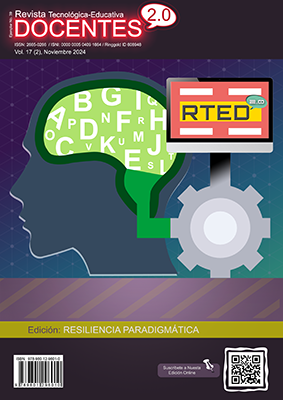Strengthening Academic Professional Identity with ORCID Codes
 DOI:
https://doi.org/10.37843/rted.v17i2.576
DOI:
https://doi.org/10.37843/rted.v17i2.576
Main Article Content
Abstract
In research and academic endeavors, a clear distinction of the activities carried out by each professional is important. This distinction is necessary for the individual recognition of researchers and advancing knowledge. The objective of the present research was to describe the characteristics of knowledge and use of ORCID among professional psychologists in Bolivia. The study used a positive paradigm, quantitative approach, non-experimental design, and a descriptive type. The population was infinite, and a probabilistic sample of 532 professional psychologists in Bolivia was used. Data collection was carried out through an offline survey. The results show that only 35.4% of professional psychologists reported having heard of ORCID, and 56.1% possess this code. The research evidences the need to increase the knowledge and adoption of the ORCID code among professional psychologists in Bolivia. The ORCID code is a valuable tool that can improve visibility, management of academic information, and collaboration among psychology professionals.
Downloads
Metrics
Article Details

This work is licensed under a Creative Commons Attribution-NonCommercial-NoDerivatives 4.0 International License.
Those authors who have publications in our journal accept the following terms:
- When a work is accepted for publication, the author retains rights of reproduction, distribution of his/her article for exploitation in all countries of the world in the format provided by our magazine and any other magnetic medium, optical, and digital.
- Authors will retain their copyright and guarantee the journal the right first to publish their work, which will be simultaneously subject to the Creative Commons Acknowledgment License (Attribution-NonCommercial-NoDerivatives 4.0 International (CC BY-NC-ND 4.0)). That allows third parties to copy and redistribute the material in any medium or format, under the following conditions: Acknowledgment - You must properly acknowledge authorship, provide a link to the license, and indicate if any changes have been made. You may do so in any reasonable way, but not in a way that suggests you have the licensor's endorsement or receive it for your use. NonCommercial - You may not use the material for a commercial purpose. NoDerivatives - If you remix, transform, or build from the material, you cannot broadcast the modified material. There are no additional restrictions - You cannot apply legal terms or technological measures that legally restrict you from doing what the license allows.
- Authors may adopt other non-exclusive license agreements to distribute the published version of the work (e.g., deposit it in an institutional archive or publish it in a monographic volume) provided that the initial publication in this journal is indicated.
- Authors are allowed and recommended to disseminate their work through the Internet (e.g., in institutional telematic archives, repositories, libraries, or their website), producing exciting exchanges and increasing the published work's citations.
- Request of withdrawal an article has to be done in writing by the author to the Editor, becoming effective after a written response from the Editor. For this purpose, the author or authors will send correspondence via e-mail: [email protected].
- The author will not receive financial compensation for the publication of his work.
- All Docentes 2.0 Journal publications are under the Open Journal System (OJS) platform at: https://ojs.docentes20.com/.
References
Aguilar, E. (2018). La importancia actual de ORCID. Red. Med UAS. http://dx.doi.org/10.28960/revmeduas.2007-8013.v8.n4.001 DOI: https://doi.org/10.28960/revmeduas.2007-8013.v8.n4.001
Arispe, C., Yangali, J., Guerrero, M., Lozada, O., Acuña, L.& Arellano, C., (2020). La investigación científica, una aproximación para los estudios de posgrado. https://n9.cl/khor1
Cabrera-Diaz E, Reyes-Gaspar PL, Charry-Méndez S. (2022). Análisis de con¬cordancia inter-jueces para medir factores protectores en salud en universitarios. Rev. cienc. Cuidad, 19(1), pp. 95-106. https://doi.org/10.22463/17949831.3055 DOI: https://doi.org/10.22463/17949831.3055
Cañedo R., Nodarse, M., & Peña, K. (2015). ORCID: en busca de un identificador único permanente y universal para científicos y académicos. Revista Cubana de información en Ciencias de la Salud. https://n9.cl/qz2w7
Carrillo Flores, A. (2015). Población y muestra. Universidad Autónoma del Estado de México. http://hdl.handle.net/20.500.11799/35134
Cejas, M., Liccioni, E., Aldaz, S., Murillo, M., & Venegas, G. (2023) Enfoque cuantitativo y cualitativo: Una mirada de los métodos mixtos. Universidad Exequiel Zamora. https://n9.cl/pefm8
Cisneros-Caicedo, A. J., Guevara-García, A. F., Urdánigo-Cedeño, J. J., & Garcés-Bravo, J. E. (2022). Técnicas e Instrumentos para la Recolección de Datos que Apoyan a la Investigación Cientí¬fica en Tiempo de Pandemia. Dominio De Las Ciencias, 8(1), pp. 1165–1185. https://doi.org/10.23857/dc.v8i1.2546 DOI: https://doi.org/10.23857/dc.v8i1.2546
Escobar, P. (2019). Guía de Investigación para Grado y Posgrado en facilito. Editorial ITM.
Gómez Ontiveros, L. V. (2017). Open Researcher and Contributor ID (ORCID). Revista Biomédica, 28(1), pp. 1-5. https://doi.org/10.32776/revbiomed.v28i1.551 DOI: https://doi.org/10.32776/revbiomed.v28i1.551
Guevara Alban, G., Verdesoto Arguello, A., & Castro Molina, N. (2020). Metodologías de investigación educativa (descriptivas, experimentales, participativas, y de investigación-acción). RECIMUNDO, 4(3), pp. 163-173. https://doi.org/10.26820/recimundo/4.(3).julio.2020.163-173 DOI: https://doi.org/10.26820/recimundo/4.(3).julio.2020.163-173
Houghton, F., & Foster, A. (2024). Resistance and Power in Irish Higher Education: ORCID and the Monitored University. The Journal of Academic Librarianship, 50(2), 102853. https://doi.org/10.1016/j.acalib.2024.102853 DOI: https://doi.org/10.1016/j.acalib.2024.102853
Krämer, T., Momeni, F., & Mayr, P. (2017). Coverage of Author Identifiers in Web of Science and Scopus. arXiv (Cornell University). https://doi.org/10.48550/arxiv.1703.01319
Ladrón de Guevara Hernández, D. (2023). Relevancia del ORCID en la divulgación científica. Revista chilena de radiología, 29(4), pp. 155. https://dx.doi.org/10.24875/rchrad.m23000023 DOI: https://doi.org/10.24875/RCHRAD.M23000023
León González, J. L., Socorro Castro, A. R., & Espinosa Cordero, C. X. (2017). Uso de la información científica y tecnológica en la investigación y la innovación. Universo Sur.
López Fernández, R., & León González, J. L. (2021). Uso del ORCID como identificador único y universal para investigadores. Revista Universidad y Sociedad, 13(2), pp. 558-567. https://n9.cl/nfoofo
ORCID. (2022). ORCID e identificadores persistentes - ORCID. https://n9.cl/21nqdk






